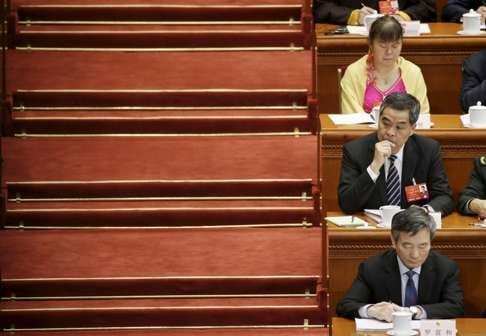
How Hong Kong can survive – even thrive – amid a decline in demand from mainland China
Lawrence J. Lau says changing economic fortunes on the mainland, as is clear in China’s latest five-year plan, mean Hong Kong must seek out and strengthen its other comparative advantages, to make itself indispensible once again

READ MORE: Key takeaways from China’s 13th five-year plan and annual reports
There is a commitment to orderly progress towards full convertibility of the renminbi. There is also an extensive discussion of the continuing liberalisation of both outbound and inbound investment.
In the Hong Kong and Macau chapter, Beijing reaffirms its general commitment to support the special administrative regions in developing their economies, improving livelihoods, advancing democracy and promoting social harmony. More specifically, the plan indicates support for Hong Kong in: first, consolidating and elevating its position as an international finance centre, transport and trade; second, developing and nurturing innovation and science and technology; and third, becoming an international legal, arbitration and mediation services centre.
The plan also indicates continuing support for Hong Kong as the leading offshore renminbi centre and an international asset management centre, and in increasing the value-added in sectors such as finance, trade, logistics and professional services. However, tourism from the mainland is no longer mentioned.
READ MORE: Hong Kong delegates to China’s NPC should help boost Sino-US ties, says Yang Jiechi

The basic idea is to have all the major East Asian blue-chip stocks list and trade in Hong Kong
The city can establish itself as the regional securities (both bonds and stocks) market, so that all East Asian – not just Chinese – enterprises and governments come to Hong Kong to raise capital and issue equity and debt, and investors worldwide only need to come to Hong Kong to invest in all East Asian economies, in bonds, stocks and private equity (including venture capital).
The securities can be denominated and traded in either US dollars or renminbi. The non-Hong-Kong stocks will be listed and traded in Hong Kong in the form of Hong Kong depositary receipts as a secondary listing. The basic idea is to have all the major East Asian blue-chip stocks list and trade in Hong Kong. The city must also work hard to develop an active, deep and liquid bond market for both short and long maturities.
READ MORE: China securities regulator breaks with tradition to attend Hong Kong delegates’ meeting

This strategy requires a proactive Hong Kong government to plan for the long term and to rally everyone in the city, including its major corporations, to work together to succeed. It will also require the support of the central government, not only because mainland investors will supply much of the funds but because Beijing can also help persuade other East Asian economies to come along.
Hong Kong is currently by far the largest and most active offshore centre for renminbi clearing, settlement, transactions and financing, with the average daily volume of transactions approaching 1 trillion yuan (HK$1.2 trillion). It is likely to continue to be so. And this is a huge advantage for Hong Kong as the renminbi becomes increasingly internationalised.
READ MORE: The rise of the renminbi

There is therefore no reason to continue to let most of the reinsurance business go to London and Zurich
Hong Kong can also be a springboard for outbound mainland direct investment because of its international links and highly developed professional services sector. The Hong Kong capital market can provide mainland enterprises with the ability to use “natural” hedges for their outbound foreign direct investments (by, for example, borrowing the foreign currency in Hong Kong to fund the outbound investment and thus balancing the foreign-currency assets with foreign-currency liabilities).
Hong Kong can also develop into a centre of innovation for East Asia. This will involve increasing investment in human capital, specifically in tertiary education, increasing investment in research and development, and creating a nurturing ecosystem for venture capital. Hong Kong must raise its tertiary education (bachelor degree) enrolment rate substantially from its current 20-plus per cent. It must also increase investment in R&D – which is indispensable for innovation – very significantly.
Hong Kong must strengthen its intellectual property (including copyright) protection, so as to protect not only scientific and technological innovations but also to encourage the development and commercialisation of creative arts.
READ MORE: HK$17b boost for Hong Kong’s innovation and technology sector aimed at fintech startups

READ MORE: Beijing’s doubts: ex-think tank chief says blueprint reflects concerns about Hong Kong’s ability to carry out plans
However, innovation, whether it is the invention of a new product, a new service or a new process, has significant fixed costs, which can be much more readily amortised in a large market. That is why access to and freedom to serve the huge mainland market are critical to the success of Hong Kong as an East Asian innovation hub. In 2015, the mainland granted 256,000 patents for invention to mainland applicants, the highest number in the world. It behoves Hong Kong to enter into an agreement with the mainland patent authorities for reciprocal recognition of patents. In addition, the mainland can also serve as a manufacturing base for Hong Kong inventions.
Because of its long tradition of rule of law, its efficient and fair judicial system, and abundance of professional legal manpower, Hong Kong can also become a centre for international legal, arbitration, dispute settlement and mediation services. It can provide the necessary accounting, legal and other services for mainland enterprises investing abroad and foreign enterprises investing in the mainland.
The success of these strategies depends critically on the support of the central government. Hong Kong must do its part in devising implementable plans and strategies, and requesting Beijing’s assistance and support on the basis that these initiatives are a win-win.
It is up to Hong Kong to make itself indispensable once again, as it was during the early days of the mainland economic reform and opening to the world.
Lawrence J. Lau is the Ralph and Claire Landau Professor of Economics at the Chinese University of Hong Kong

